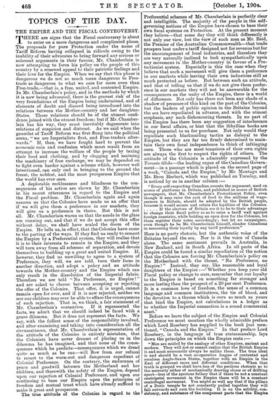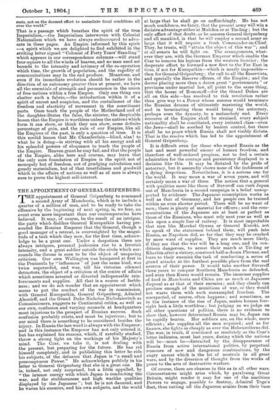TOPICS OF THE DAY.
THE EMPIRE AND THE FISCAL CONTROVERSY. THERE are signs that the Fiscal controversy is about to enter on a more dangerous and complicated phase. The proposals for pure Protection under the name of Tariff Reform having collapsed in ridicule owing to the inability of their advocates to bring forward any serious or coherent arguments in their favour, Mr. Chamberlain is now attempting to force his policy on the people of this country by a renewed appeal to their patriotic feelings and their love for the Empire. When we say that this phase is dangerous we do not so much mean dangerous to Free- trade as dangerous to what we care for more even than Free-trade,—that is, a free, united, and contented Empire.
In Mr. Chamberlain's policy, and in the methods by which it is now being advocated, there is the gravest risk of the very foundations of the Empire being undermined, and of elements of doubt and discord being introduced into the relations between the Mother-country and her daughter- States. Those relations should be of the utmost confi- dence joined with the utmost freedom; but if Mr. Chamber- . lain has his way, they must inevitably degenerate into relations of suspicion and distrust. As we said when the gauntlet of Tariff Reform was first flung into the political arena, "we are Imperialists first, and Free-traders after- wards." If, then, we have fought hard to prevent the economic ruin and confusion which must result from an attempt to increase the welfare of the people by taxing their food and clothing, and by clogging and maiming the machinery of free exchange, we may be depended on to fight even harder against a scheme which, however well intentioned, can only end in bringing to the ground the freest, the noblest, and the most prosperous Empire that the world has ever seen.
A deplorable recklessness and blindness to the con- sequences of his action are shown by Mr. Chamberlain in his recent utterances in regard to the Empire and the Fiscal problem. Mr. Chamberlain again and again assures us that the Colonies have made us an offer that if we will give them a preference in our markets, they will give us a preference in theirs. But this is not all. Mr. Chamberlain warns us that the sands in the glass are running out, and that if we do not accept this offer without delay, we shall have sealed the doom of the Empire. He tells us, in effect, that the Colonies have come to the parting of the ways. If they find us ready to cement the Empire by a Preferential system, they will realise that it is to their interests to remain in the Empire, and they will turn away from all schemes of separation, and devote themselves to building up a great and united Empire. If, however, they find us unwilling to agree to a system of Preference, they will, we are told, turn their faces in another direction, and adopt a policy and an attitude towards the Mother-country and the Empire which can only result in the dissolution of the Imperial fabric. Therefore we are told "No Preference, no Empire ! " and are asked to choose between accepting or rejecting the offer of the Colonies. That offer, it is urged, cannot remain open for ever, and if it is now rejected, neither we nor our children may ever be able to efface the consequences of such rejection. That is, we think, a fair statement of Mr. Chamberlain's contention. If it represented the facts, we admit that we should indeed be faced with a grave dilemma. But it does not represent the facts. We say, with the fullest sense of the responsibility involved, and after examining and taking into consideration all the circumstances, that Mr. Chamberlain's representation of the attitude of the Colonies is entirely mistaken, that the Colonists have never dreamt of placing us in the dilemma be has imagined, and that none of the conse- quences which he predicts—consequences which we dread quite as much as he can—will flow from our refusal to revert to the worn-out and dangerous expedient of Colonial Preference. On the contrary, the endurance of peace and goodwill between the Motherland and her children, and therewith the safety of the Empire, depend upon our rejection of Colonial Preference, and upon our continuing to base our Empire upon the principles of freedom and mutual trust which have already sufficed to make it great and prosperous. The true attitude of the Colonies in regard to the asset.' Preferential schemes of Mr. Chamberlain is perfectly clear and intelligible. The majority of the people in the self- governing nations of the Empire have chosen to base their own fiscal systems on Protection. At the present moment they believe—that some day they will think differently is not only our view, but the view of such men as Mr. Reid, the Premier of the Australian Commonwealth—that trade prospers best under a tariff designed not for revenue but for the encouragement of local industries, and therefore they are very naturally inclined to look sympathetically upon any movement in the Mother-country in favour of a Pro- tectionist system. Especially is this the case when they believe that such a movement will give them a preference in our markets while leaving their own industries still as much protected as before. But between such an attitude, and that of telling us that if we do not give them prefer- ence in our markets they will not be answerable for the consequences on the unity of the Empire, there is a world of difference. Not only has there not been any shade of a shadow of pressure of this kind on the part of the Colonies, but the leaders of public opinion in the Britains beyond the sea have repudiated in advance, and with the utmost emphasis, any such dishonouring threats. In no part of the Empire has there been any suggestion of interference in our fiscal affairs, or hint that the Sibylline books are being presented to us for purchase. Not only would they repudiate such blackmailing tactics as disloyal to the Empire, but they are far too firmly determined to main- tain their own fiscal independence to think of infringing ours. Those who are most tenacious of their own rights are always the first to respect the rights of others. The attitude of the Colonists is admirably expressed by the Toronto Globe—the leading organ of the Canadian Govern- ment—in a passage which is placed on the second page of a work, "Canada and the Empire," by Mr. Montagu and Mr. Bron Herbert, which was published on Tuesday, and is noticed by us in another column :— " Every self-respecting Canadian resents the argument, used on scores of platforms in Britain, and published in scores of British newspapers, that Mr. Chamberlain's Protectionist Policy, even though it may raise the cost of food to the millions of wage- earners in Britain, should be adopted by the British people, because it would secure and retain the loyalties of the Colonies.
If the electors of Britain see it to be to their advantage to change their fiscal policy so as to raise a tariff wall against foreign countries, while holding an open door for the Colonies, let them register their votes accordingly; but let no campaigner, even though he be Mr. Chamberlain himself, slander Canadians in measuring their loyalty by any tariff preference."
Here is no party rhetoric, but the authentic voice of the Britains beyond the sea. Nor is it the voice of Canada alone. The same sentiment prevails in Australia, in New Zealand, and in South Africa. In all parts of the Empire could be found a similar repudiation of the notion that the Colonies are forcing Mr. Chamberlain's policy on the Motherland with the threat, "No Preference, no Empire ! " Instead, they say, like reasonable and loyal daughters of the Empire :—‘ Whether you keep your old Fiscal policy or change to ours, remember that our loyalty to the Empire is based on something far stronger and more lasting than the prospect of a 20 per cent. Preference. It is a common love of freedom, the sense of a common language and common institutions, the tie of blood, and the devotion to a throne which is ours as much as yours that bind the Empire, not calculations in a ledger as to whether the Imperial connection is a sound commercial Before we leave the subject of the Empire and Colonial Preference we must mention the wholly admirable preface which Lord Rosebery has supplied to the book just men- tioned, "Canada and the Empire." In that preface Lord Rosebery, in the language of true statesmanship, lays down the principles on which the Empire rests :— " Men are misled by the analogy of other Empires, ancient and modern. They will not or cannot realise that the British Empire is and must necessarily always be unlike these. The true ideal is and should be a vast co-operative league of contented and emulous Anglo-Saxon States, together with an Empire in the East of different races and different conditions. When that truth is grasped we shall have less of the perilous rhetoric as to the necessity either of mechanically_ drawing closer or of drifting apart—less of the specious fallacy that if there be not a constant centripetal movement in the Empire there will be a constant centrifugal movement. You might as well say that if the pillars of a Doric temple be not constantly pulled together they will fall outwards and ruin the building. It is on the solidity, con- sistency, and substance of the component parts that the Empire rests, not on the doomed effort to assimilate fiscal conditions all over the world."
That is a passage which breathes the spirit of the true Imperialism,—the Imperialism interwoven with Colonial Nationalism which we have always endeavoured to advo- cate in these pages. An Empire informed by this spirit —a spirit which we are delighted to find exhibited in the striking letter signed "Colonist of Forty Years' Standing" which appears in our correspondence columns—will stand four-square to all the winds of heaven, and. no man need set bounds to the intensity and intimacy of the co-operation which time, the growth of population, and the rapidity of communications may in the end. produce. Meantime, and even if its immediate evolution should be rather in the direction of an autonomy greater than at present, we have all the essentials of strength and permanence in the union of free nations within a free Empire. Only one thing can shatter such a fabric,—the introduction within it of a spirit of unrest and suspicion, and the curtailment of the freedom and elasticity of movement in the constituent parts. Once teach the people of the Motherland and of the daughter-States the false, the sinister, the despicable lesson that the Empire is worthless unless the nations which form it can show, or think they can show, some definite percentage of gain, and the ruin of our Empire, like all the Empires of the past, is only a question of time. It is this sordid lesson that Mr. Chamberlain—blind, alas ! to what he is doing—is striving with all his energy and all his splendid powers of eloquence to teach the people of the Empire. Heaven grant he may fail, and that the people of the Empire, alike here and oversea, may learn that the only sure foundation of Empire is the spirit not of monopoly but of freedom, not of grudging calculation and greedy materialism, but of that trustfulness and goodwill which in the affairs of nations as well as of men is always sure to prove the highest self-interest.























































 Previous page
Previous page